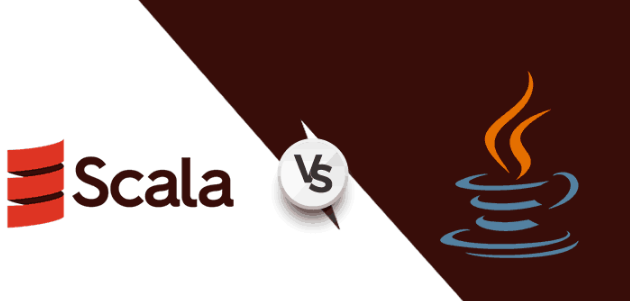Programmers today have an impressive range of programming languages to choose from and create unique, visually-appealing software products. However, a lack of knowledge and subject-matter expertise can put you in an overwhelming situation, and you may end up choosing the wrong programming language for your project. Although there are 250-2,500 coding languages available worldwide, our mobile app development company will focus today on the top two programming languages – Scala vs Java.
Without further ado, let’s get the ball rolling.
What is Scala?
Scala refers to a general-purpose programming language that integrates features of both object-oriented and functional programming. It was first designed to address the limitations of Java and provide a concise, expressible, and scalable programming language. Scala runs on the Java Virtual Machine (JVM) and is used for a variety of applications such as web development, data analysis, and distributed systems.
The most salient feature of Scala is its ability to handle both object-oriented and functional programming concepts. It allows developers to write clean, concise, and expressive code. Also, Scala has a rich standard library that includes functions for working with collections, concurrency, and other programming tasks.
Another advantage of Scala is its interoperability with Java. It means that developers can use existing Java libraries and tools while working with Scala, and you can also call Scala code from Java code. Additionally, Scala is used in a variety of applications including web development, data analysis, distributed systems, and more. Scala programming language is used by many tech-giant companies including Twitter, Intel, and IBM.
If you are planning to build a large-scale application, Scala is your go-to programming language. Above all, Scala is a versatile and powerful programming language that you can leverage to develop complex applications hassle-freely.
What are the advantages of Scala?
Scala is an object-oriented, and functional programming language, which makes it a popular choice for developing large-scale applications. Some of the amazing advantages of Scala include:
- Concise and expressive code: Scala’s syntax is designed to be very compact and expressive, resulting in less coding and increased productivity of the developers.
- Supports both object-oriented and functional programming: Scala allows developers to write code in both object-oriented and functional styles, which helps them to provide a highly flexible experience, making it easier for them to resolve complex problems.
- Interoperable with Java: Scala runs on the Java Virtual Machine (JVM), which means the developers can use existing Java libraries and tools while working with Scala. Scalability The word “Scala” means a scalable language, which is designed to handle large-scale applications and big data processing.
- Strong type system: Scala offers a static type of system that helps developers to catch errors in the early development stage, making it easier to maintain and scale applications over time.
- Rich standard library: Scala has a rich standard library that provides common functionality for tasks including collections, concurrency, and more.
- Active and supportive community: Scala has a large, active, and supportive community of developers who can contribute to the language and its libraries.
Lastly, Scala is a combination of concise syntax, functional, and object-oriented programming support, scalability, and interoperability with Java. This combination makes Scala a powerful language for developing complex applications.
What is Java?
In simple words, Java is a class-based, object-oriented programming language, released in 1995. It is designed to be portable and run on any device with a Java Virtual Machine (JVM) installed in the system. Java development services are one of the most widely used programming languages in the world and is used for varied applications, including web development, mobile app development, and enterprise software.
Java runs on the principle of “Write Once, Run Anywhere”, which means that Java code can be written on any platform and run on any platform that has a JVM installed. This process makes Java a highly portable language and reduces the need for developers to write platform-specific code.
Java is a well-designed programming language, that offers great security, and provides features like memory management and automatic garbage collection to help prevent malicious attacks and security vulnerabilities. Overall, Java is a versatile, portable, and secure programming language widely used for building a variety of applications.
What are the advantages of Java?
Java offers a wide range of advantages that makes it the most popular choice for mobile application development:
- Portability: Java is designed to be portable and run on any device with a Java Virtual Machine (JVM) installed, making it a platform-independent language.
- Object-oriented: Java is a class-based, object-oriented programming language, which makes it easy to model real-world objects and their relationships.
- Security: Java provides several security features, including memory management and automatic garbage collection, which prevent common security vulnerabilities.
- Large and active community: Java has a large and active community of developers who contribute to the language and its libraries, making it well-supported and well-documented.
- Robust: Java has a robust system and automatic memory management, which helps ensure that codes are reliable and free from memory leaks and other common bugs.
- High-performance: Java is well-known for its impressive performance, thanks to its Just-in-Time (JIT) compiler and Java Virtual Machine (JVM)
- Enterprise-friendly: Java is a widely used programming language for enterprise application development and offers a large set of libraries and tools that make it well-suited for such projects.
- Scalability: Java is a well-designed platform that handles large-scale applications, and big-data processing smoothly.
Summary
Overall, Java’s features like portability, security, reliability, and ease of use make it a popular choice for developing a wide range of applications, from mobile apps to large-scale enterprise systems.
Like Java and Scala, every programming language offers unique features, which a developer with subject-matter expertise can navigate better. Therefore, hire Java developers from a well-renowned mobile application development company like ours and, we shall guide you with the best language and platforms for a hassle-free app development experience.







